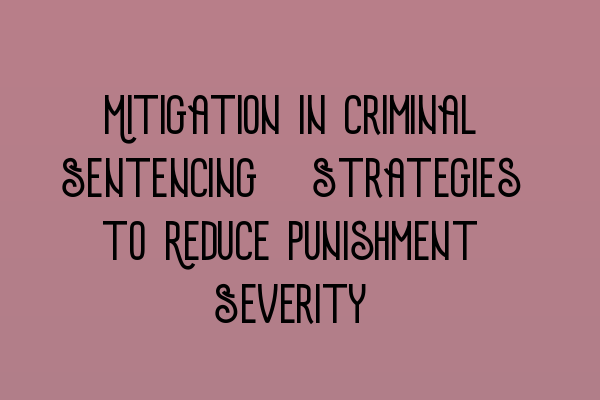Mitigation in Criminal Sentencing: Strategies to Reduce Punishment Severity
When facing criminal charges, one of the most crucial aspects to consider during the sentencing phase is mitigation. Mitigation strategies can help reduce the severity of punishment imposed by the court. In this article, we will explore various effective mitigation strategies that individuals can employ to potentially reduce the consequences of criminal sentencing.
Understanding Mitigation
Mitigation is the process of presenting evidence and arguments to the court in order to persuade the judge or magistrate to impose a lesser penalty. The aim is to highlight factors that decrease the defendant’s blameworthiness or demonstrate extenuating circumstances surrounding the offense.
Effective Mitigation Strategies
1. Early guilty plea: By pleading guilty at the earliest opportunity, defendants demonstrate remorse and save the court’s time and resources, which can be taken into account during sentencing.
2. Character references: Providing character references from upstanding members of the community, such as employers, teachers, or community leaders, can help portray the defendant in a positive light and showcase their good character.
3. Rehabilitation efforts: Showing successful efforts at rehabilitation, such as completing counseling programs, undergoing therapy, or obtaining employment, can exhibit the defendant’s commitment to personal growth and reducing the likelihood of reoffending.
4. Genuine remorse: Expressing genuine remorse and taking responsibility for the offense can demonstrate an understanding of the impact of one’s actions and a willingness to make amends.
5. Lack of criminal history: If the defendant has a clean record with no prior convictions, it can be seen as a positive factor during sentencing.
6. Voluntary restitution: Offering to compensate any victims or affected parties for damages or losses incurred can showcase a proactive approach in rectifying the harm caused.
7. Mental health considerations: Providing evidence of any mental health issues or psychological conditions that may have contributed to the offense can help the court understand the underlying factors and consider appropriate sentencing options.
Seeking Professional Legal Advice
It is important to note that each case is unique, and the effectiveness of mitigation strategies may vary depending on the circumstances. Consulting with an experienced criminal defense solicitor is critical to develop a robust mitigation strategy tailored to your specific case.
At SQE Criminal Law & Practice Law UK, we offer comprehensive legal services to guide you through the criminal justice system. Our expert solicitors have a wealth of experience in developing effective mitigation strategies and defending clients in court.
If you require further information or assistance, please feel free to contact us or explore our related articles:
- SQE 1 Practice Exam Questions
- SQE 1 Practice Mocks FLK1 FLK2
- SQE 2 Preparation Courses
- SQE 1 Preparation Courses
- SRA SQE Exam Dates
Remember, understanding the importance of mitigation in criminal sentencing and employing effective strategies is fundamental in potentially reducing punishment severity. Trust SQE Criminal Law & Practice Law UK to provide you with the expert advice and assistance you need during this challenging time.
